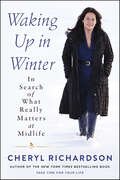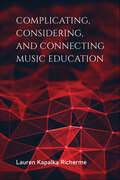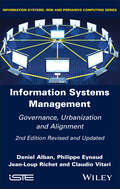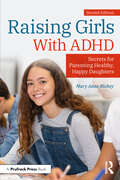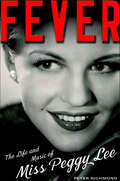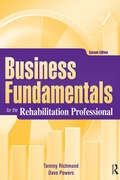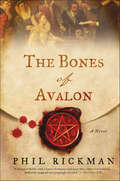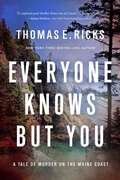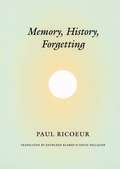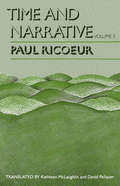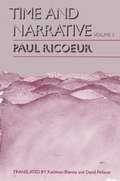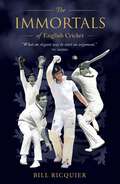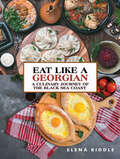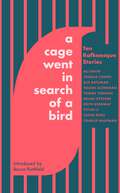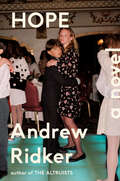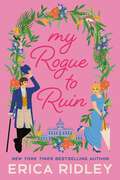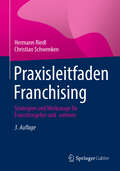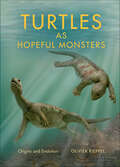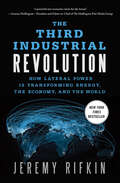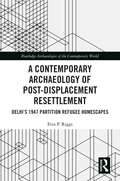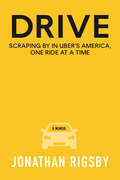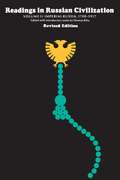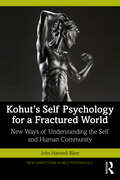- Table View
- List View
Waking Up in Winter: In Search of What Really Matters at Midlife
by Cheryl RichardsonInternationally recognized coach and New York Times bestselling author Cheryl Richardson has toured the world empowering others to make lasting change. But when Richardson’s own life no longer worked as it once had, a persistent, inner voice offered unmistakable guidance: it was time to reevaluate her life to uncover what really mattered.Waking Up in Winter is the candid and revelatory account of how at midlife, Richardson found renewed contentment and purpose through a heroic, inward journey. The unfolding story, told through intimate journal entries, follows Richardson from the first, gentle nudges of change to a thoughtfully reimagined life – a soulful, spring awakening.With an experienced coach’s intuition and an artist’s eye, Richardson reexamines everything – her marriage, her work, her friendships, and her priorities – gracefully shedding parts of the self that no longer serve along the way. In the end, she not only discovers what really matters at midlife, she invites readers to join her in the inquiry process by providing thought-provoking questions designed to usher them through their own season of transformation. Offering up Richardson’s most powerful teaching tool yet – her own life – Waking Up in Winter takes readers on a brave, spiritual adventure that shows us all how to live a more authentic and meaningful life.
Complicating, Considering, and Connecting Music Education (Counterpoints: Music and Education)
by Lauren Kapalka RichermeIn Complicating, Considering, and Connecting Music Education, Lauren Kapalka Richerme proposes a poststructuralist-inspired philosophy of music education. Complicating current conceptions of self, other, and place, Richerme emphasizes the embodied, emotional, and social aspects of humanity. She also examines intersections between local and global music making. Next, Richerme explores the ethical implications of considering multiple viewpoints and imagining who music makers might become. Ultimately, she offers that music education is good for facilitating differing connections with one's self and multiple environments. Throughout the text, she also integrates the writings of Gilles Deleuze and Félix Guattari with narrative philosophy and personal narratives. By highlighting the processes of complicating, considering, and connecting, Richerme challenges the standardization and career-centric rationales that ground contemporary music education policy and practice to better welcome diversity.
Information Systems Management: Governance, Urbanization and Alignment
by Jean-Loup Richet Daniel Alban Philippe Eynaud Claudio VitariInformation Systems Management is intended to sensitize the heads of organizations to the issues raised by information systems (IS). Through its pedagogical presentation, this book ensures that issues related to IS are not left solely to the experts in the field. This book combines and analyzes three key concepts in IS science: governance, urbanization and alignment. While governance implies the implementation of a certain number of means, bodies and procedures to manage IS more effectively, urbanization involves visualization methods to enable the manager to take into account the different levels of the organization of an IS and their coherence. Finally, alignment assesses the ability of the IS to make a significant contribution to the organization's strategy.
Raising Girls With ADHD: Secrets for Parenting Healthy, Happy Daughters
by Mary Anne RicheyThe second edition of the best-selling Raising Girls with ADHD features the latest information on research and treatment for girls with ADHD presented in an easily accessible format.The book is packed with expert information to empower parents to make decisions about identification, treatment options, behavioral strategies, personal/social adjustment, educational impact, and many other issues from preschool through high school. Featuring practical suggestions and interventions, this book is a comprehensive guide for parents interested in helping their daughters with ADHD reach their full potential. Based on the author’s years of personal and professional experience, this book covers topics not often found in other parenting guides, such as the preschool years and early diagnosis, a Dynamic Action Treatment Plan parents and their daughters can work on together, as well as guidance for teens on money management, getting their first job and post high school planning. In addition to expert guidance, this new edition also features interviews with girls and their mothers sharing their personal strategies for success in managing ADHD.Full of tactics, resources, and tools, this book will provide the support you need to build a positive relationship with your daughters while seeking the most appropriate treatments and support.
Fever: The Life and Music of Miss Peggy Lee
by Peter RichmondThe first major biography of the legendary singer—an enthralling accountof a charismatic artist moving through the greatest, most glamorous era of American music "I learned courage from Buddha, Jesus, Lincoln, and Mr. Cary Grant." So said Peggy Lee, the North Dakota girl who sang like she'd just stepped out of Harlem. Einstein adored her; Duke Ellington dubbed her "the Queen." With her platinum cool and inimitable whisper she sold twenty million records, made more money than Mickey Mantle, and along with pals Frank Sinatra and Bing Crosby presided over music's greatest generation. Yet beneath the diamonds she was still Norma Delores Egstrom, insecure and always looking for acceptance. Drawing on exclusive interviews and new information, Peter Richmond delivers a complex, compelling portrait of an artist and an era that begins with a girl plagued by loss, her father's alcoholism, and her stepmother's abuse. One day she gets on a train hoping her music will lead her someplace better. It does—to a new town and a new name; to cities and clubs where a gallery of brilliant innovators are ushering in a brand-new beat; to four marriages, a daughter, Broadway, Vegas, and finally Hollywood. Richmond traces how Peggy rose, right along with jazz itself, becoming an unstoppable hit-maker ("Fever," "Mañana," "Is That All There Is?"). We see not only how this unforgettable star changed the rhythms of music, but also how—with her drive to create, compose, and perform—she became an artist whose style influenced k.d. lang, Nora Jones, and Diana Krall. Fever brings the lady alive again—and makes her swing.
Business Fundamentals for the Rehabilitation Professional
by Tammy Richmond Dave PowersThe world of business is ever changing, with much of the available information becoming quickly out-of-date. Business Fundamentals for the Rehabilitation Professional, Second Edition keeps pace with this changing world and provides the health care professional with the latest information to answer the “what, where, how, and when” questions that come up when transforming a health care practice idea into a successful business.With this updated Second Edition, Tammy Richmond and Dave Powers take the health care professional to the next level of implementing successful business operations by the introduction of applications of management principles, as well as implementation of evidence-based practice guidelines and basics to billing and coding documentation. Business Fundamentals for the Rehabilitation Professional, Second Edition addresses how to identify emerging business opportunities, legal and health care regulatory issues, market research and development, and health care operations.New features in the Second Edition: New Management and Operations checklist An in-depth look at reimbursement, billing, and financial survival Strategic target market promotions Updated templates and tools Review questions Downloadable worksheets available with text purchase Keeping the user-friendly format of a workbook, Business Fundamentals for the Rehabilitation Professional, Second Edition is the perfect resource for master and doctorate level students preparing for the professional world, as well as rehabilitation professionals and entrepreneurs interested in obtaining knowledge in starting up, managing, expanding, or understanding the health care practice system.What will you learn? How to create a vision and mission statement How to develop a business and marketing plan How to manage finances within the scope of the practice What are your local state and federal regulations What are the small business guidelines
The Bones of Avalon: A Novel
by Phil RickmanA country divided. A newly crowned, desperately vulnerable young queen. Can one man uncover the secret that will save her throne?It is 1560, and Elizabeth Tudor has been on the throne for a year. Dr. John Dee, at 32 already acclaimed throughout Europe, is her astrologer and consultant in the hidden arts… a controversial appointment in these days of superstition and religious strife.When dangerous questions of Elizabeth's legitimacy arise, the mild, bookish Dee finds himself summoned before William Cecil, who tasks him with an important mission. Along with Robert Dudley, Dee's daring friend and former student who is also rumored to be the Queen's secret lover, Dee must travel to the famously mystical town of Glastonbury to find the missing bones of King Arthur. Once these long-lost relics, the embodiment of a legacy vitally important to the Tudor line, are ensconced in London, doubts as to the Queen's supremacy as the rightful Tudor heir will be dispelled. But the quest quickly turns deadly—Dee and Dudley arrive in Glastonbury to discover the town mourning the gruesome execution of its abbot, and more death soon follows at the old abbey. Racing to uncover the secrets buried there, Dee finds himself caught in the tangled roots of English magic, unexpected violence, the breathless stirring of first love… and the cold heart of a complex plot against Elizabeth.
Everyone Knows But You: A Tale of Murder on the Maine Coast
by Thomas E. RicksAn FBI agent finds himself in the insular world of a fishing village on the Maine coast where the rules are different—sometimes lethally so.After his wife and two children are killed in a car crash, Ryan Tapia starts a new life in Maine. But his first case there is a puzzling oddball—the corpse of a fisherman washes up on federal land, while the man&’s boat drifts into waters that are part of an Indian reservation. Ryan quickly learns the nuances of Maine life as he delves into two illicit coastal trades: hard drugs and rare fish. Many of the locals are happy to see that particular fisherman dead. What&’s more, they are not shy about noting that Ryan must have screwed up pretty badly to be posted to such a remote location as Bangor, Maine. Undaunted, Ryan works to understand the unforgiving way of life on Liberty Island, where people live by an older, harsher code. Adrift on a sailboat one day, he encounters a man from the Malpense tribe, living as a hermit on a remote island, who witnessed something that fateful day. In his riveting crime debut, New York Times bestselling author Thomas E. Ricks turns his literary talents to land he knows deeply, from working in the Maine woods and trapping lobsters year-round. Everyone Knows But You is a rich and dynamic crime novel that brings a unique part of America to vivid, thrilling life.
Memory, History, Forgetting
by Paul RicoeurWhy do major historical events such as the Holocaust occupy the forefront of the collective consciousness, while profound moments such as the Armenian genocide, the McCarthy era, and France's role in North Africa stand distantly behind? Is it possible that history "overly remembers" some events at the expense of others? A landmark work in philosophy, Paul Ricoeur's Memory, History, Forgetting examines this reciprocal relationship between remembering and forgetting, showing how it affects both the perception of historical experience and the production of historical narrative.Memory, History, Forgetting, like its title, is divided into three major sections. Ricoeur first takes a phenomenological approach to memory and mnemonical devices. The underlying question here is how a memory of present can be of something absent, the past. The second section addresses recent work by historians by reopening the question of the nature and truth of historical knowledge. Ricoeur explores whether historians, who can write a history of memory, can truly break with all dependence on memory, including memories that resist representation. The third and final section is a profound meditation on the necessity of forgetting as a condition for the possibility of remembering, and whether there can be something like happy forgetting in parallel to happy memory. Throughout the book there are careful and close readings of the texts of Aristotle and Plato, of Descartes and Kant, and of Halbwachs and Pierre Nora. A momentous achievement in the career of one of the most significant philosophers of our age, Memory, History, Forgetting provides the crucial link between Ricoeur's Time and Narrative and Oneself as Another and his recent reflections on ethics and the problems of responsibility and representation.“His success in revealing the internal relations between recalling and forgetting, and how this dynamic becomes problematic in light of events once present but now past, will inspire academic dialogue and response but also holds great appeal to educated general readers in search of both method for and insight from considering the ethical ramifications of modern events. . . . It is indeed a master work, not only in Ricoeur’s own vita but also in contemporary European philosophy.”—Library Journal “Ricoeur writes the best kind of philosophy—critical, economical, and clear.”— New York Times Book Review
Time and Narrative, Volume 2
by Paul RicoeurIn volume 1 of this three-volume work, Paul Ricoeur examined the relations between time and narrative in historical writing. Now, in volume 2, he examines these relations in fiction and theories of literature. Ricoeur treats the question of just how far the Aristotelian concept of "plot" in narrative fiction can be expanded and whether there is a point at which narrative fiction as a literary form not only blurs at the edges but ceases to exist at all. Though some semiotic theorists have proposed all fiction can be reduced to an atemporal structure, Ricoeur argues that fiction depends on the reader's understanding of narrative traditions, which do evolve but necessarily include a temporal dimension. He looks at how time is actually expressed in narrative fiction, particularly through use of tenses, point of view, and voice. He applies this approach to three books that are, in a sense, tales about time: Virgina Woolf's Mrs. Dalloway; Thomas Mann's Magic Mountain; and Marcel Proust's Remembrance of Things Past. "Ricoeur writes the best kind of philosophy—critical, economical, and clear."—Eugen Weber, New York Times Book Review "A major work of literary theory and criticism under the aegis of philosophical hermenutics. I believe that . . . it will come to have an impact greater than that of Gadamer's Truth and Method—a work it both supplements and transcends in its contribution to our understanding of the meaning of texts and their relationship to the world."—Robert Detweiler, Religion and Literature "One cannot fail to be impressed by Ricoeur's encyclopedic knowledge of the subject under consideration. . . . To students of rhetoric, the importance of Time and Narrative . . . is all too evident to require extensive elaboration."—Dilip Parameshwar Gaonkar, Quarterly Journal of Speech
Time and Narrative, Volume 3
by Paul RicoeurIn the first two volumes of this work, Paul Ricoeur examined the relations between time and narrative in historical writing, fiction, and theories of literature. This final volume, a comprehensive reexamination and synthesis of the ideas developed in volumes 1 and 2, stands as Ricoeur's most complete and satisfying presentation of his own philosophy. Ricoeur's aim here is to explicate as fully as possible the hypothesis that has governed his inquiry, namely, that the effort of thinking at work in every narrative configuration is completed in a refiguration of temporal experience. To this end, he sets himself the central task of determing how far a poetics of narrative can be said to resolve the "aporias"—the doubtful or problematic elements—of time. Chief among these aporias are the conflicts between the phenomenological sense of time (that experienced or lived by the individual) and the cosmological sense (that described by history and physics) on the one hand and the oneness or unitary nature of time on the other. In conclusion, Ricoeur reflects upon the inscrutability of time itself and attempts to discern the limits of his own examination of narrative discourse. "As in his previous works, Ricoeur labors as an imcomparable mediator of often estranged philosophical approaches, always in a manner that compromises neither rigor nor creativity."—Mark Kline Taylor, Christian Century "In the midst of two opposing contemporary options—either to flee into ever more precious readings . . . or to retreat into ever more safe readings . . . —Ricoeur's work offers an alternative option that is critical, wide-ranging, and conducive to new applications."—Mary Gerhart, Journal of Religion
The Immortals of English Cricket
by Bill RicquierIn The Immortals of English Cricket, Bill Ricquier tells the cricketing life stories of eleven of England's greatest (male) cricketers. Ricquier selects his Immortal English team from players who didn't just dominate, they changed the game with their sheer will. Those portrayed include: Jack Hobbs, the highest run-scorer in the history of first-class cricket; Ian Botham, who was the most famous sportsman in the country in the 1980s; and James Anderson, England's leading Test wicket taker. Selected also is Wilfred Rhodes, the legendary slow left arm bowler who made almost 40,000 first-class runs and took over 4,000 first-class wickets, and the extraordinary Fred Trueman, described as the "finest bloody fast bowler that ever drew breath." The Immortals of English Cricket will inspire discussion, debate and controversy but indisputably represents a team of remarkable skill and character, one to proudly represent the Crown and Three Lions on any Elysian field.
Eat Like a Georgian – a Culinary Journey of the Black Sea Coast
by Elena RiddleWhile not everyone has the chance to voyage to far-off lands and indulge in native delicacies, it's often that these world cuisines find their way to us. Whether through a local restaurant, a takeaway order, or a homemade culinary adventure, we’ve become familiar with the flavours of Italy, China, or India. But what about venturing into the unexplored? How about diving into the culinary treasures of a small country, once the eastern frontier of the Roman Empire, boasting a wine-making legacy spanning millennia? Welcome to the rich cuisine of Georgia! Explore its unique recipes, crafted with easily attainable ingredients, which might just find a permanent spot in your culinary rotation. Ready to tantalize your taste buds? Why not go Georgian tonight?
A Cage Went in Search of a Bird: Ten Kafkaesque Stories
by Keith Ridgway Helen Oyeyemi Joshua Cohen Ali Smith Yiyun Li Naomi Alderman Elif Batuman Tommy Orange Charlie Kaufman Leone RossA collection of brand-new short stories written by prize-winning, bestselling writers and inspired by Kafka - published to commemorate the centenary of his death*Chosen as a 2024 highlight in the Guardian, the Financial Times, the Daily Mail, New Statesman, Esquire and the New European*Franz Kafka is widely regarded as one of the great geniuses of twentieth-century literature. What happens when some of the most original literary minds of today take an idea, a mood or a line from his work and use it to spark something new?From a future society who ask their AI servants to construct a giant tower to reach God; to a flat hunt that descends into a comically absurd bureaucratic nightmare; to a population experiencing a wave of unbearable, contagious panic attacks, these ten specially commissioned stories are by turns mind-bending, funny, unsettling and haunting. Inspired by the visionary imagination of a writer working one hundred years ago, they speak powerfully to the strangeness of being alive today.
A Cage Went in Search of a Bird: Ten Kafkaesque Stories
by Keith Ridgway Helen Oyeyemi Joshua Cohen Ali Smith Yiyun Li Naomi Alderman Elif Batuman Tommy Orange Charlie Kaufman Leone RossA collection of brand-new short stories written by prize-winning, bestselling writers and inspired by Kafka - published to commemorate the centenary of his death*Chosen as a 2024 highlight in the Guardian, the Financial Times, the Daily Mail, New Statesman, Esquire and the New European*Franz Kafka is widely regarded as one of the great geniuses of twentieth-century literature. What happens when some of the most original literary minds of today take an idea, a mood or a line from his work and use it to spark something new?From a future society who ask their AI servants to construct a giant tower to reach God; to a flat hunt that descends into a comically absurd bureaucratic nightmare; to a population experiencing a wave of unbearable, contagious panic attacks, these ten specially commissioned stories are by turns mind-bending, funny, unsettling and haunting. Inspired by the visionary imagination of a writer working one hundred years ago, they speak powerfully to the strangeness of being alive today.
Hope: A Novel
by Andrew RidkerA New York Times Editors' ChoiceA Boston Globe, Forward, and Times of Israel Best Book of the Year&“Riotous. . . . Hilarious . . . impeccably written . . . . Intelligent, bighearted, spew-your-gefilte-fish-funny.&” —The New York Times Book Review &“A writer with this much talent can take his readers anywhere.&” —The Washington Post&“Painfully funny. . . . This rivals Taffy Brodesser-Akner&’s Fleishman is in Trouble in its pitch-perfect portrayal of Jewish American life.&” —Publishers Weekly (starred review)&“A comedy of (bad) manners. . . . Engaging.&” —The Boston GlobeA hilarious and heartfelt novel about a seemingly perfect family in an era of waning American optimism, from the acclaimed author of The AltruistsThe year is 2013 and the Greenspans are the envy of Brookline, Massachusetts, an idyllic (and idealistic) suburb west of Boston. Scott Greenspan is a successful physician with his own cardiology practice. His wife, Deb, is a pillar of the community who spends her free time helping resettle refugees. Their daughter, Maya, works at a distinguished New York publishing house and their son, Gideon, is preparing to follow in his father&’s footsteps. They are an exceptional family from an exceptional place, living in exceptional times.But when Scott is caught falsifying blood samples at work, he sets in motion a series of scandals that threatens to shatter his family. Deb leaves him for a female power broker; Maya rekindles a hazardous affair from her youth; and Gideon drops out of college to go on a dangerous journey that will put his principles to the test.From Brookline to Berlin to the battlefields of Syria, Hope follows the Greenspans over the course of one tumultuous year as they question, and compromise, the values that have shaped their lives. But in the midst of their disillusionment, they&’ll discover their own capacity for resilience, connection, and, ultimately, hope.
My Rogue to Ruin (The Wild Wynchesters #4)
by Erica RidleyThis fabulously fun Regency romp featuring witty banter, a dash of mystery, lots of kissing, and an adorable hedgehog, will bring all the adventure you've been waiting for! Marjorie Wynchester has always let her siblings take the lead when it comes to planning their investigations. But someone in London is trying to pass off counterfeits, and this time she's the only one with the skill needed to find the culprit. Soon, all the evidence leads her straight to Lord Adrian Webb. Adrian is a roguish scoundrel of the first order, but he never meant to get caught up in a forgery scheme. Especially one that&’s snowballed out of control. Now a blackmailer is out to ruin him, and the most alluring woman he's ever met is trying to put him behind bars. Every time Marjorie thinks she has Adrian figured out, her assumptions turn on their head. He&’s a heartless scoundrel. A loyal brother. A smooth liar. A good kisser. Er…wait… Is winning her affections just one more attempt to avoid the law? Or is it possible he&’s not such a rogue after all?
Praxisleitfaden Franchising: Strategien und Werkzeuge für Franchisegeber und -nehmer
by Hermann Riedl Christian SchwenkenFranchisesysteme verstehen, systematisch aufbauen und für alle Beteiligten zum Erfolg machen ist ein komplexes Unterfangen. Wie das geht, erfahren Sie in diesem Buch. Franchisegeber wie auch Franchisenehmer erhalten wertvolle Strategien und Tools für das Tagesgeschäft und Antworten auf grundlegende Fragen: Wie können verschiedene Franchisesysteme aus den unterschiedlichsten Perspektiven bewertet werden? Welche Rolle spielen Regelwerke und deren Inhalte dabei? Wie funktionieren die verschiedenen Prozesse und wie kann die Zusammenarbeit erfolgreich verlaufen? Wie können Marketingmaßnahmen im Franchisesystem gesteuert werden?Die Autoren liefern wertvolle und direkt in den Arbeitsalltag integrierbare Werkzeuge und Mustervorlagen u. a. zu Mitbewerberanalysen, Dienstplänen, Personalaudits, Tages- und Umsatzplanungen. Die dritte Auflage wurde überarbeitet und um aktuelle Veränderungen in der Rechtsprechung sowie die Themen Lizenzvertrag versus Franchisevertrag, Gebietsschutz und Scheinselbstständigkeit ergänzt.Ein unverzichtbarer Leitfaden für alle, die praxisnahe Informationen zum Thema Franchising suchen und sofort anwenden wollen.
Turtles as Hopeful Monsters: Origins and Evolution (Life of the Past)
by Olivier RieppelWhere do turtles hail from? Why and how did they acquire shells? These questions have spurred heated debate and intense research for more than two hundred years. Brilliantly weaving evidence from the latest paleontological discoveries with an accessible, incisive look at different theories of biological evolution and their proponents, Turtles as Hopeful Monsters tells the fascinating evolutionary story of the shelled reptiles. Paleontologist Olivier Rieppel traces the evolution of turtles from over 220 million years ago, examining closely the relationship of turtles to other reptiles and charting the development of the shell. Turtle issues fuel a debate between proponents of gradual evolutionary change and authors favoring change through bursts and leaps of macromutation. The first book-length popular history of its type, this indispensable resource is an engaging read for all those fascinated by this ubiquitous and uniquely shaped reptile.
The Third Industrial Revolution: How Lateral Power Is Transforming Energy, the Economy, and the World
by Jeremy RifkinThe Industrial Revolution, powered by oil and other fossil fuels, is spiraling into a dangerous endgame. The price of gas and food are climbing, unemployment remains high, the housing market has tanked, consumer and government debt is soaring, and the recovery is slowing. Facing the prospect of a second collapse of the global economy, humanity is desperate for a sustainable economic game plan to take us into the future.Here, Jeremy Rifkin explores how Internet technology and renewable energy are merging to create a powerful "Third Industrial Revolution." He asks us to imagine hundreds of millions of people producing their own green energy in their homes, offices, and factories, and sharing it with each other in an "energy internet," just like we now create and share information online.Rifkin describes how the five-pillars of the Third Industrial Revolution will create thousands of businesses, millions of jobs, and usher in a fundamental reordering of human relationships, from hierarchical to lateral power, that will impact the way we conduct commerce, govern society, educate our children, and engage in civic life.Rifkin's vision is already gaining traction in the international community. The European Union Parliament has issued a formal declaration calling for its implementation, and other nations in Asia, Africa, and the Americas, are quickly preparing their own initiatives for transitioning into the new economic paradigm.The Third Industrial Revolution is an insider's account of the next great economic era, including a look into the personalities and players — heads of state, global CEOs, social entrepreneurs, and NGOs — who are pioneering its implementation around the world.
The Zero Marginal Cost Society: The Internet of Things, the Collaborative Commons, and the Eclipse of Capitalism
by Jeremy RifkinIn The Zero Marginal Cost Society,New York Times bestselling author Jeremy Rifkin describes how the emerging Internet of Things is speeding us to an era of nearly free goods and services, precipitating the meteoric rise of a global Collaborative Commons and the eclipse of capitalism.Rifkin uncovers a paradox at the heart of capitalism that has propelled it to greatness but is now taking it to its death—the inherent entrepreneurial dynamism of competitive markets that drives productivity up and marginal costs down, enabling businesses to reduce the price of their goods and services in order to win over consumers and market share. (Marginal cost is the cost of producing additional units of a good or service, if fixed costs are not counted.) While economists have always welcomed a reduction in marginal cost, they never anticipated the possibility of a technological revolution that might bring marginal costs to near zero, making goods and services priceless, nearly free, and abundant, and no longer subject to market forces.Now, a formidable new technology infrastructure—the Internet of things (IoT)—is emerging with the potential of pushing large segments of economic life to near zero marginal cost in the years ahead. Rifkin describes how the Communication Internet is converging with a nascent Energy Internet and Logistics Internet to create a new technology platform that connects everything and everyone. Billions of sensors are being attached to natural resources, production lines, the electricity grid, logistics networks, recycling flows, and implanted in homes, offices, stores, vehicles, and even human beings, feeding Big Data into an IoT global neural network. Prosumers can connect to the network and use Big Data, analytics, and algorithms to accelerate efficiency, dramatically increase productivity, and lower the marginal cost of producing and sharing a wide range of products and services to near zero, just like they now do with information goods. The plummeting of marginal costs is spawning a hybrid economy—part capitalist market and part Collaborative Commons—with far reaching implications for society, according to Rifkin. Hundreds of millions of people are already transferring parts of their economic lives to the global Collaborative Commons. Prosumers are plugging into the fledgling IoT and making and sharing their own information, entertainment, green energy, and 3D-printed products at near zero marginal cost. They are also sharing cars, homes, clothes and other items via social media sites, rentals, redistribution clubs, and cooperatives at low or near zero marginal cost. Students are enrolling in free massive open online courses (MOOCs) that operate at near zero marginal cost. Social entrepreneurs are even bypassing the banking establishment and using crowdfunding to finance startup businesses as well as creating alternative currencies in the fledgling sharing economy. In this new world, social capital is as important as financial capital, access trumps ownership, sustainability supersedes consumerism, cooperation ousts competition, and "exchange value" in the capitalist marketplace is increasingly replaced by "sharable value" on the Collaborative Commons. Rifkin concludes that capitalism will remain with us, albeit in an increasingly streamlined role, primarily as an aggregator of network services and solutions, allowing it to flourish as a powerful niche player in the coming era. We are, however, says Rifkin, entering a world beyond markets where we are learning how to live together in an increasingly interdependent global Collaborative Commons.
A Contemporary Archaeology of Post-Displacement Resettlement: Delhi’s 1947 Partition Refugee Homescapes (Routledge Archaeologies of the Contemporary World)
by Erin P. RiggsThis book explores the archaeology of the 1947 Partition, the largest mass migration in human history, and the resulting resettlement of half a million refugees in Delhi, India’s capital city.Interweaving material analysis with oral history collection and archival sources, this book considers how Delhi’s Partition refugees have interacted with the city's built landscapes through time. It demonstrates how government-built refugee colonies, influenced by both socialist and capitalist design philosophies, provided an effective and adaptable setting for resettlement. In contrast, it illustrates how Delhi’s pre-Partition landscapes—including ‘evacuee properties’ vacated by out-migrating Muslims and sections of the planned, colonial capital—have proven more problematic venues for rehousing. In these contexts, refugee families navigated life within homes shaped by past occupants and colonial-era wealth disparities. The book highlights that despite such difficulties and the unprecedented scale of Partition’s impact on Delhi, refugees have obtained an impressive degree of material success and social acceptance in the city. This example challenges assumptions about the aid-dependency of refugee communities, the potential effectiveness of public housing, and the mutability of national belonging.This interdisciplinary case study will be of interest to scholars in varied fields of study, including archaeology, architectural history, cultural anthropology, human geography, and South Asian studies.
Drive: Scraping By in Uber's America, One Ride at a Time
by Jonathan RigsbyOne father, three years, and thousands of rides Poverty, By America meets Maid in this dad&’s darkly humorous yet humanizing story of working long hours and late nights behind the wheel as a rideshare driverJonathan Rigsby spends his days as a crime intelligence analyst and his nights as an Uber driver. Reeling from his divorce and struggling to pay rent while caring for his autistic son, Rigsby became a rideshare driver, joining the millions of people with a side hustle just to make ends meet.With a compelling blend of honesty and sardonic wit, Rigsby invites readers into his car to reveal the harsh reality of gig work for so many: grueling hours, living paycheck to paycheck, and hoping to avoid disaster long enough to prepare for the next bill. Along the way, he showcases the humor and humanity in the private moments of vulnerability that happen when people are left alone with a stranger — from the amusing tales of drunk college students to a passenger getting sick on the dashboard, a mother expressing distress about her son&’s addiction, and a violent encounter on the job.Unflinching and raw, Drive exposes an ugly truth that hides in the gaudy background of the American dream: you can do everything right and still fail. Buckle up.
Readings in Russian Civilization Volume II: Imperial Russia, 1700–1917 (None Ser.)
by Thomas Riha"This new and enlarged version of Readings in Russian Civilization is the result of fairly extensive revisions. There are now 72 instead of 64 items; 20 of the selections are new. The first volume has undergone the least change with 3 new items, of which 2 appear in English for the first time. In the second volume there are 6 new items; all of them appear in English for the first time. The third volume has undergone the greatest revision, with 11 new items, of which 6 are newly translated from the Russian. It is the editor's hope that items left out in the new edition will not be sorely missed, and that the new selections will turn out to be useful and illuminating. The aim, throughout, has been to cover areas of knowledge and periods which had been neglected in the first edition, and to include topics which are important in the study of the Russian past and present. "The bibliographical headnotes have been enlarged, with the result that there are now approximately twice as many entries as in the old edition. New citations include not only works which have appeared since 1963, but also older books and articles which have come to the editor's attention."—From the Editor's Preface ". . . a judicious combination of seminal works and more recent commentaries that achieves the editor's purpose of stimulating curiosity and developing a point of view."—C. Bickford O'Brien, The Russian Review "These three volumes cover quite well the main periods of Russian civilization. The choice of the articles and other material is made by a competent and unbiased scholar."—Ivan A. Lopatin, Professor of Asian and Slavic Studies, University of Southern California
Kohut's Self Psychology for a Fractured World: New Ways of Understanding the Self and Human Community (New Directions in Self Psychology)
by John Hanwell RikerDrawing from Kohut's conceptualisation of self, Riker sets out how contemporary America's formulation of persons as autonomous, self-sufficient individuals is deeply injurious to the development of a vitalizing self-structure—a condition which lies behind much of the mental illness and social malaise of today's world.By carefully attending to Kohut's texts, Riker explains the structural, functional, and dynamic dimensions of Kohut's concept of the self. He creatively extends this concept to show how the self can be conceived of as an erotic striving for connectedness, beauty, and harmony, separate from the ego. Riker uses this distinction to reveal how social practices of contemporary American society foster skills and traits to advance the aims of the ego for power and control, but tend to suppress the needs of the self to authentically express its ideals and connect with others. The book explores the impact that this view can have on clinical practice, and concludes by imaginatively constructing an ideal self-psychological society, using Plato's Republic as a touchstone.Informed by self psychology and philosophy, this book is essential reading for psychoanalysts, psychotherapists and philosophers, seeking to revisit and revise constructions of both self and humanity.
